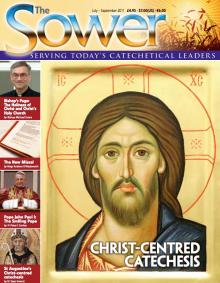‘This Church is full of sinners, and there is always room for one more’: so reads the poster outside a Baptist church.
The same could be said - although understood rather differently - of any Catholic community, from the smallest parish to the worldwide Church. There have certainly been hypocrites, crackpots and downright nasty people in the Church, and there still are.
People criticise Church wealth, leaders whose lives contradict what they preach, support for oppressive regimes, a failure to love. Church members are often no better than other people. Scandalous things have been done. The Church was, and is, a community of sinners.
Where is the Holy Church?
Yet we still believe in one holy Church. If our own Church is a community of sinners, where is the community of saints, the Holy Church of Christ? People have often tried to form a ‘holiness Church’, a community of all saints and no sinners. But if sinners are excluded, no-one is left to form the saintly remnant! We are all sinners (1 Jn 1:8), saying together ‘Forgive us our trespasses’. Nor can we simply distinguish a Holy Church from its sinful members. We, the members, are the Church.
What then do we mean by ‘holy’? In the Old Testament, holiness implied separation from the profane world and dedication to God as his special possession (Lev 20:26), ‘set apart for sacred duties’. The Church is holy because God has made us so: ‘You are a chosen race, a royal priesthood, a consecrated nation, a people set apart’ (1 Pet 2:9). God is always faithful to his choice, and the Church therefore remains always holy.
Saints in Christ
Now God makes his people holy in a new and richer way, through intimate union with Jesus Christ. Through Baptism we are his Body, his beloved Bride, and share his holiness. We are already ‘saints in Christ Jesus’ (Phil 1:1). The Church is here and now a communion of saints, a people made holy ‘in Christ’. We cannot lose that holiness. It is guaranteed by God’s bestowal of his Holy Spirit and by his special gifts of the Scriptures and the Sacraments.
Making holy is always the work of God, the fountain of all holiness. If we open our lives to him, as individuals and communities, we become truly holy, inwardly transformed and made new.
A genuine though imperfect holiness
This is a gradual process, reaching perfection only in heaven. We take seriously today the pilgrim nature of the Church, but that is not a new teaching. St.Thomas Aquinas wrote: ‘To be a Church in splendour, without spot or wrinkle, is the ultimate goal to which we are being led by the Passion of Christ. This will come about in heaven, not on earth’.i
The Second Vatican Council developed this doctrine. The Church will attain perfection only in the glory of heaven.ii The Christian community is ‘at the same time holy and always in need of being purified, and incessantly pursues the path of penance and renewal’.iii
The imperfections of the Church are all too obvious; but its living holiness, past and present, is just as evident. Already now the Church is ‘marked with a genuine though imperfect holiness’, ‘holy in a way that can never fail’.iv God is faithful to his people; Jesus is always with his Church; the Spirit of Holiness stays active here among us.
The Church is always a Holy Community, rooted in its Holy Communion with our Lord. It is above all in the Eucharist, celebrated through the ages and across the world, that Christ keeps the Church holy. There the community of sinners is truly a community of saints, on pilgrimage together from sinfulness to holiness. Christ says to his Church both, ‘You are holy!’ and ‘Become holy!’ Holiness is a gift but also a challenge from God.
It is people who have made up the Church through the ages, and those people were, are and will be a community both of saintliness and sinfulness. Our own personal holiness and sinfulness affects the Church today, for better, for worse. For all its graced, God- filled life. the Church is a human community, a mixed bag of good and bad (cf Matt 13:24f and 13:47f).
We are not alone
The Church is not only a community of earthly pilgrims. It includes also the Saints in heaven, those we know and celebrate and those millions of unknown saints who live with God. Our communion with them makes the Church always a holy Church.
These saints together give a rich vision of the meaning of holiness. Holiness is about love, God’s love present in and through our human love. A truly human Church prays and worships, but also reaches out in active love for the sad and sick, the poor and oppressed. There is such saintliness everywhere in the Church today, in well-known figures and in the ordinary but loving lives of ordinary people.
The Church is a community which embraces the rich and the poor, the saint and the sinner, you and me in both our holiness and sinfulness. The Church on earth in indeed full of sinners, but Christ is with us, leading us forward and transforming us - if we let him - into a communion of saints.
This article is originally on pages 14-15 of the printed edition.
This article is from The Sower and may be copied for catechetical purposes only. It may not be reprinted in another published work without the permission of Maryvale Institute. Contact [email protected]

















